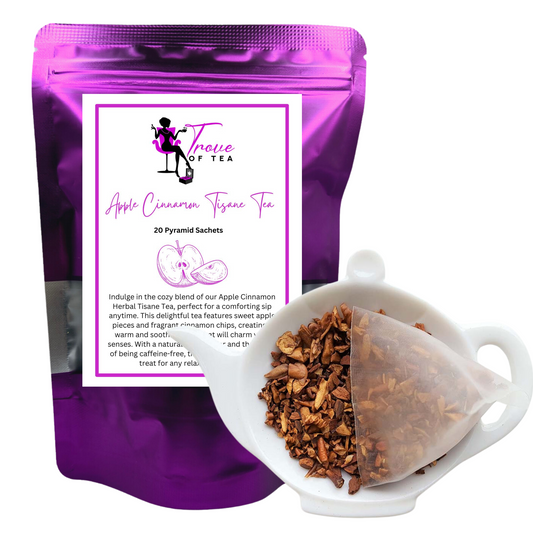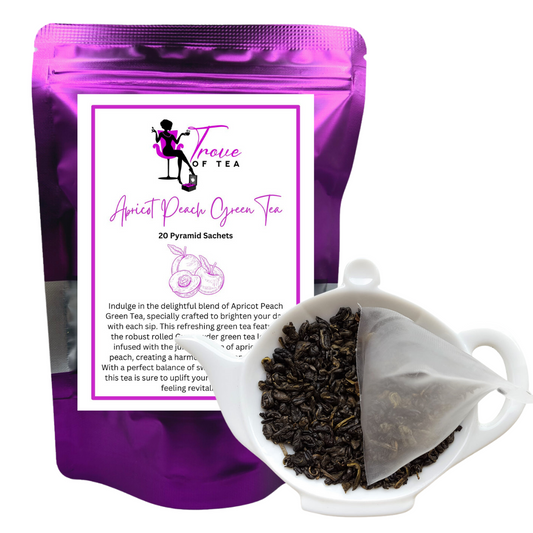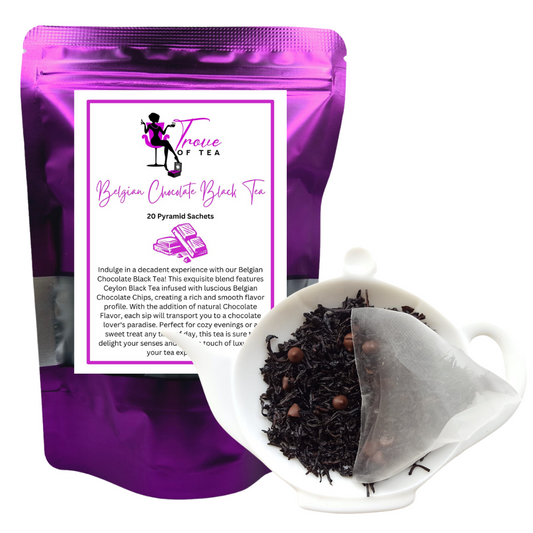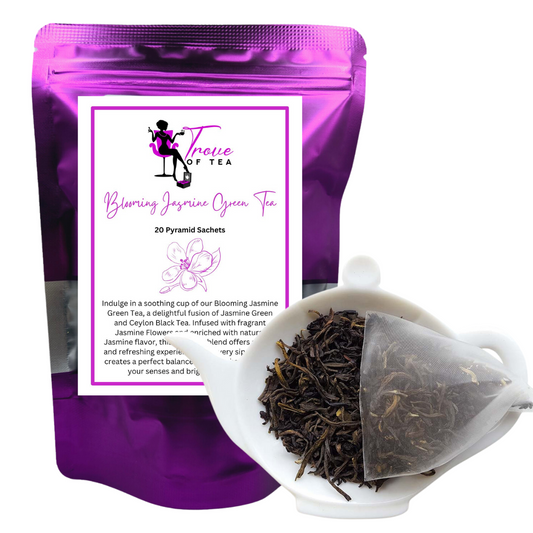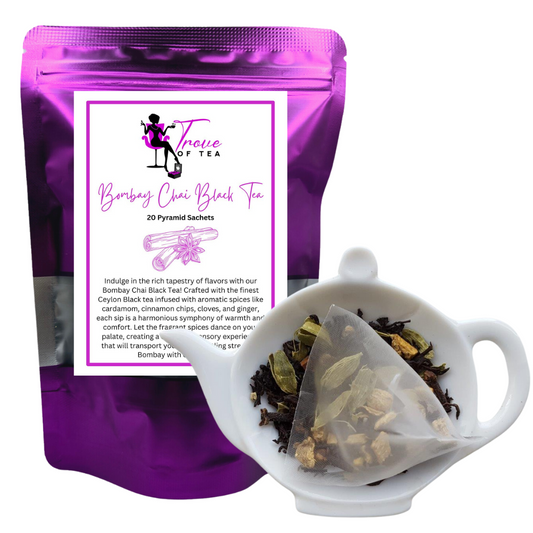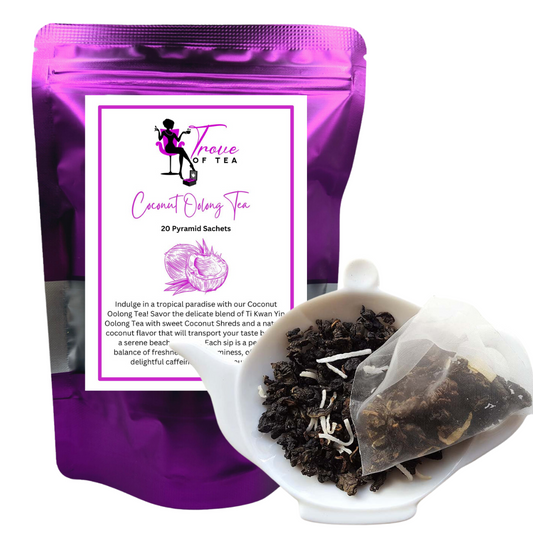
The Sacred Pause: 9 Benefits of Quiet Time with Tea and God
Trove of Tea ShopShare
In the relentless rush of modern life, where notifications never cease and demands never diminish, there exists a countercultural sanctuary—the set apart habit of quiet time with God, accompanied by the simple practice of tea. This practice is not merely a pleasant routine but a profound spiritual discipline that anchors the soul, sharpens the mind, and nourishes the heart.
As we explore 9 life-changing benefits of quiet time with Tea and God, we'll draw deeply from the well of Old Testament wisdom (KJV) while savoring the contemplative qualities of our Raspberry Oolong Tea—a blend whose delicate balance of bright raspberry notes and earthy oolong undertones mirrors the harmony we find in God's presence.
1. Soul Restoration: From Weariness to Renewal
"He maketh me to lie down in green pastures: he leadeth me beside the still waters. He restoreth my soul." Psalm 23:2–3 (KJV)
Benefit Insight:
The imagery of green pastures and still waters speaks directly to our overloaded nervous systems. Just as tea requires proper steeping time to release its full flavor profile, our souls require unhurried moments with God to release their burdens and receive renewal. The caffeine in some tea provides gentle alertness while L-theanine promotes calm focus—a perfect physiological parallel to how God simultaneously energizes and settles our spirits.
Practical Application:
- Begin with a "tea preparation meditation": As the kettle heats, pray for God to warm your heart to His presence
- During the 3-5 minute steeping time, practice breath prayer: Inhale "Be still" (Psalm 46:10), exhale "and know"
- Hold your warm cup and visualize handing concerns to God as steam rises
2. Divine Clarity: Stillness Before Strategy
"I will instruct thee and teach thee in the way which thou shalt go: I will guide thee with mine eye." Psalm 32:8 (KJV)
Benefit Insight:
The Hebrew word for "guide" here (yāʿaṣ) implies counsel that comes through intimate relationship rather than distant instruction. Like watching tea leaves unfurl to reveal their full character, we must create space for God to reveal His thoughts gradually. The pratice of tea drinking—the measured pouring, the attentive sipping—trains us in the patience required to receive divine direction.
Practical Application:
- Keep a "tea & truth" journal: On left pages record Scriptures, on right pages note personal revelations
- Practice the "Three Sip Method":
1st sip: Ask God a specific question
2nd sip: Listen in silence
3rd sip: Write what comes to mind
- Use different teacups for different prayer focuses (e.g., a wide bowl cup for expansive dreams, a narrow cup for focused petitions)
3. Warrior's Preparation: Strength in the Secret Place
"But they that wait upon the Lord shall renew their strength; they shall mount up with wings as eagles; they shall run, and not be weary; and they shall walk, and not faint." Isaiah 40:31 (KJV)
Benefit Insight:
The Hebrew word for "wait" (qāvâ) carries the connotation of tension—like a bowstring being drawn back before release. Our quiet time is this set apart tension where potential energy becomes kinetic. Tea's natural antioxidants mirror this spiritual principle—what appears to be inactive steeping time is actually when the most powerful compounds are being extracted.
Practical Application:
- Create a "strength steeping" tea time:
• Minute 1-2: Read Scripture aloud
• Minute 3-4: Silent meditation while tea steeps
• Minute 5: Pray while holding warm cup, visualizing God's power filling you
- Use the tea's caffeine peak (30-45 minutes after drinking) to tackle challenging tasks with spiritual momentum
4. Gratitude Practice: Transforming Perspective
"It is a good thing to give thanks unto the Lord, and to sing praises unto thy name, O most High." Psalm 92:1 (KJV)
Benefit Insight:
The Hebrew word for "give thanks" (yādâ) literally means to extend the hands. As we hold our teacup—palms upward, receiving the warmth—we physically embody the posture of gratitude. Tea's natural sweetness becomes a tangible reminder of God's goodness waiting to be noticed in every circumstance.
Practical Application:
- Practice "Gratitude Infusion":
• For each teabag sipped, name one blessing
• As sweetener dissolves, recall how God has sweetened bitter experiences
• With each sip, whisper thanks for a specific grace
- Create a "praising tea blend" by adding ingredients representing blessings (e.g., cinnamon for warmth of relationships, orange peel for bursts of joy)
5. Sacred Intimacy: The Luxury of Attention "Be still, and know that I am God." Psalm 46:10 (KJV)
Benefit Insight:
The Hebrew verb for "be still" (raphâ) means to release your grip—to stop trying to control outcomes. Teatime traditions across cultures emphasize presence over productivity. Tea, with its multiple possible steepings, teaches us that depth comes through returning again and again to the same source.
Practical Application:
- Implement "Tea Time Protocol":
• Phone on airplane mode becomes your "tea must"
• Let the tea's temperature guide your time—drink while warm, don't let it go cold
• Use the tea's natural finish (aftertaste) as a prompt to linger in reflection
- Try "Progressive Steeping Prayer":
1st infusion: Praise (tasting the tea's bright top notes)
2nd infusion: Confession (noticing deeper flavors emerging)
3rd infusion: Intercession (drawing out the full-bodied wisdom)
6. Peace That Defies Circumstance
"Thou wilt keep him in perfect peace, whose mind is stayed on thee: because he trusteth in thee." Isaiah 26:3 (KJV)
Benefit Insight:
The Hebrew "perfect peace" (shālôm shālôm) is a redoubled intensity—peace squared. Like tea that must be at the correct temperature to release its ideal flavor profile, our minds require specific conditions to experience God's peace. The time of preparing tea creates a "peace protocol" for our nervous systems.
Practical Application:
- Develop a "Peace Prescription":
• When anxious: Hold warm cup to pulse points while reciting Isaiah 26:3
• Create a "peace blend" by combining with chamomile when needing extra calm
• Use the tea's steam as a visual aid for "breathing in" God's peace
- Practice "Providing Peace": After drinking, observe the pattern of leaves at cup's bottom as a reminder of God's unique design in your situation
7. Perspective Renewal: From Temporal to Eternal
"The Lord is my light and my salvation; whom shall I fear?" Psalm 27:1 (KJV)
Benefit Insight:
In Hebrew thought, light (ʼôr) represents both illumination and delight. The sparkling clarity of well-brewed oolong in a glass teapot becomes a physical metaphor for how God's truth dispels shadows of fear. Tea's oxidation process—where leaves transform through careful exposure to air—mirrors how our trials transform us when exposed to God's light.
Practical Application:
- Conduct "Light & Leaf" Meditation:
• Brew tea in clear glass vessel near a window
• As sunlight shines through, pray for God to illuminate specific concerns
• Note how the tea's color changes with time—ask God to show eternal perspectives on temporal problems
- Keep a "teacup testimony" record of how fears were overcome through previous quiet time with God is not just a routine—it’s a rebellion against the chaos of the world. It’s where weary hearts find strength, distracted minds find focus, and thirsty souls find living water (Jeremiah 2:13).
8. Holy Discipline: The Compound Interest of Consistency
"O God, thou art my God; early will I seek thee." Psalm 63:1 (KJV)**
Benefit Insight:
The Hebrew "early" (shachar) implies both timely priority and eager longing. Like the tea plant that must be harvested at precise times for optimal flavor, our spiritual lives require intentional rhythms. The ceremonial aspects of tea preparation train us in the beauty of disciplined devotion.
Practical Application:
- Build a "Tea & Truth" Routine:
• Sunday: Plan weekly tea varieties correlating with prayer focuses
• Wednesday: Midweek "tea check-in" to assess spiritual growth
• Friday: "Feel Free Friday"—freeform prayer with less structure
- Track spiritual "steeping progress": Note how extended quiet times yield deeper insights, like multiple tea infusions
9. Sacred Joy: The Flavor of God's Presence
"In thy presence is fulness of joy; at thy right hand there are pleasures for evermore." Psalm 16:11 (KJV)
Benefit Insight:
The Hebrew "fulness" (śōḇaʻ) suggests abundant satisfaction. Just as tea connoisseurs speak of "mouthfeel"—the tactile pleasure of a perfectly brewed cup—Scripture describes spiritual joy as something to be savored bodily. Tea's natural taste reminds us that God's joy often comes in surprising notes.
Practical Application:
- Practice "Joyful Sipping":
• First sip: Recall a joyful memory of God's faithfulness
• Middle sips: Identify current sources of joy
• Final sip: Anticipate future joy in God
- Create a "joy blend" by mixing tea with rose petals when needing emotional uplift.
Final Sip: Your Invitation to Sacred Stillness
In conclusion, as you finish the last drops of your Tea, remember this: quiet time with God is not just a routine—it’s a rebellion against the chaos of the world. It’s where weary hearts find strength, distracted minds find focus, and thirsty souls find living water (Jeremiah 2:13).
So tomorrow, before the day demands your attention, steal away with your Bible, your tea, and God. Let the aroma of steeping leaves remind you—God is near, and His presence is the greatest benefit of all. Always remember, "Taste and see that the LORD is good, blessed are they that trusteth in him." Psalms 34:8.




